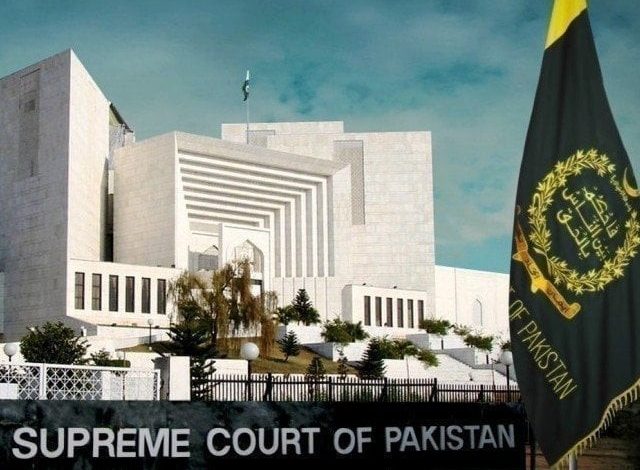The judiciary is currently on trial.

The Supreme Court will now decide their complaints regarding judicial independence and the trichotomy of powers after five judges from the Islamabad High Court (IHC) filed petitions on various topics.
The IHC judges have already petitioned the supreme court. They had sent a letter to the Supreme Judicial Council (SJC) in March of last year, asking for advice on how executive agencies could interfere with judicial duties.
It’s important to mention that Justice Muhammad Arbab Tahir was among the judges at the time. He is no longer with them, though, which could affect their case.
“This is the worst era in Pakistan’s judicial history,” said Shahid Jamil Khan, a former judge on the Lahore High Court, who expressed profound sadness at the development. In addition to seeking justice through a constitutional petition, judges of the IHC are mandated by the constitution to administer justice.
“I support the petition as required to shake the conscience of the justices seated in the same Supreme Court building where the harmed judges went in a normal manner to seek justice, even though it is unusual to file it in person. The former LHC judge stated, “I was personally appalled to see the debased judiciary, kneeling before a hybrid system of which many sitting judges are an integral part.”
Prominent attorney Saiful Malook claimed to have studied the IHC justices’ constitutional petitions. He pointed out that the petition complaints’ primary accusations of judicial oath violations, pressure on judges to rule against the Constitution and the law, and presidential meddling in the high court’s operations were unusual.
He claimed that in addition to the executive branch, the outgoing chief justice and the Pakistani Supreme Court were also the targets of these accusations.
“It appears to be a first impression case that has ever been brought by federal constitutional court judges in any nation worldwide. The Supreme Court has historically had to decide whether to uphold constitutional protections and defend the fundamental rights of judges in constitutional courts or to rule that their status is no superior than that of the petitioner judges.
“If they are unable to uphold the Constitution, they should say so openly, so that the people of Pakistan know clearly that the judicial organ of the state is a fraud, and that the judges of the highest court are only concerned with a monthly salary of Rs3 million plus perks worth more than Rs5 million each, and that no one should look to them for justice under the Constitution and law,” Malook said.
“As a lawyer, it was a very sad and depressing day,” advocate Chaudhry Faisal Hussain remarked.
“Seeing my own institution disintegrating to the point where judges themselves are in the highest court to seek justice is difficult and exhausting. The institution of the judiciary is being attacked, not any one individual,” he continued.
He added that only the Supreme Judicial Council (SJC) is authorized by the Constitution to hear complaints against judges of superior courts, making the ruling prohibiting Justice Tariq Mehmood Jahangiri unlawful and unconstitutional.
Qazi Faez Isa, the former top justice of Pakistan, summoned the six IHC judges to the CJP House after they had already written to the SJC. According to reports, their letter clearly disturbed Justice Isa.
He was forced to call a full court session to address it, nevertheless. The former CJP met with Prime Minister Shehbaz Sharif the following day, accompanied by Justice Syed Mansoor Ali Shah, and proposed the formation of an inquiry commission to look into the claims.
CJP Isa was forced to start suo motu proceedings on the IHC judges’ letter when former CJP Tassaduq Hussain Jillani resigned from his position as head of the probe body.
Several high courts acknowledged during the hearing that agency meddling in judicial operations was a “open secret.” The case is still open.
The 26th Amendment to the Constitution was successfully passed by the government in the interim. Critics claim that this amendment was meant to guarantee the executive branch’s supremacy over the judiciary. The administration has mostly been successful in strengthening its hold since it was passed.
The apex court supported the executive’s plan after five judges contested the transfer of three judges to the IHC. IHC judges have now petitioned the Supreme Court once more.
The executive wants the SJC to be launched against Justice Jahangiri, according to senior lawyers.
Six SC judges will play a critical role in cases involving IHC judges. In a similar vein, CJP Yahya Afridi, Justice Syed Mansoor Ali Shah, and Justice Munib Akhtar’s roles on the SJC will also be crucial. The fixing of their petitions will also be determined by a three-member committee that consists of Justice Muhammad Ali Mazhar, Justice Jamal Khan Mandokhail, and Justice Aminuddin Khan.
There is a belief that a particular segment of the judiciary that now controls the SC does not like the five IHC judges or IHC Chief Justice Sardar Muhammad Sarfraz Dogar.
The specific ruling in the transfer case of the IHC justices would be crucial. The five IHC justices’ position may even be supported by the minority opinion.